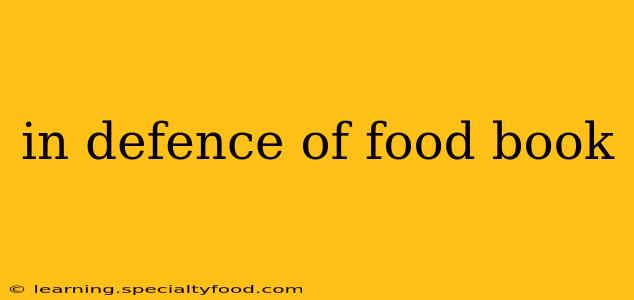Michael Pollan's In Defense of Food: An Eater's Manifesto isn't just a book; it's a call to arms against the modern food industry and a passionate plea for a return to simpler, healthier eating habits. Published in 2008, its relevance only intensifies with each passing year as concerns about processed foods, industrial agriculture, and our disconnect from the origins of our food continue to grow. This exploration delves into the core arguments of Pollan's manifesto and addresses some frequently asked questions surrounding his work.
What is the main point of In Defense of Food?
Pollan's central argument revolves around the idea that we've lost our way when it comes to food. He posits that the modern food system, driven by profit and technological innovation, has led us astray from the basic principles of healthy eating. Instead of relying on simple, whole foods, we've embraced a diet dominated by processed foods, engineered for shelf stability and palatability, but often lacking in essential nutrients and potentially harmful to our health. His book isn't a rigid diet plan; rather, it's a philosophy promoting a mindful and intuitive approach to food, encouraging us to reconnect with nature and traditional foodways. The book encourages us to think critically about what we eat and where it comes from, advocating for a return to more natural and less processed foods.
What are the seven rules of Pollan's food philosophy?
While not explicitly numbered as "seven rules," Pollan's book implicitly lays out guiding principles for healthy eating. These principles, distilled from his arguments, encourage a more intuitive and mindful approach to food choices:
-
Eat food: This seemingly simple rule is foundational. Pollan advocates for consuming foods that are recognizable as food—things your grandmother would recognize. Avoid anything with ingredients you can't pronounce or that resemble chemicals more than food.
-
Don't eat too much: Moderation and mindful eating are key. Pay attention to your body's hunger cues and avoid overeating.
-
Eat mostly plants: A plant-based diet rich in fruits, vegetables, and whole grains is emphasized. These foods provide essential nutrients and fiber, supporting overall health.
These three simple rules form the core of Pollan's message, with the subsequent points adding nuance and context:
-
Avoid processed foods: Minimize consumption of heavily processed foods, particularly those high in added sugars, unhealthy fats, and artificial ingredients.
-
Cook at home more often: Preparing your own meals allows for control over ingredients and portion sizes, fostering healthier eating habits.
-
Pay attention to the source of your food: Understanding where your food comes from—the farm, the farmer, the local market—fosters appreciation for the food chain and encourages the consumption of locally-sourced, seasonal products.
-
Avoid products with too many ingredients: This is a corollary to "Eat food." Avoid food products with long, incomprehensible ingredient lists.
These tenets, when followed thoughtfully, can dramatically improve one's diet and health. They encourage a deeper connection with our food and a more sustainable approach to eating.
What are the criticisms of In Defense of Food?
While widely praised, In Defense of Food has faced criticism. Some argue that Pollan's emphasis on "real food" is overly romanticized and doesn't account for the realities of modern life, particularly for those with limited access to fresh, affordable food. Others criticize his seemingly simplistic approach, suggesting it neglects the complexities of nutrition science and individual dietary needs. Furthermore, some find his criticisms of processed foods too sweeping, ignoring the potential benefits of certain processed foods for specific dietary needs or preferences.
Is In Defense of Food still relevant today?
Absolutely. In fact, the book's arguments resonate even more strongly today. The rise of ultra-processed foods, concerns about food sustainability, and growing awareness of the impact of diet on health make Pollan's message more timely than ever. The book serves as a powerful reminder to take control of our food choices and prioritize a more conscious, healthier approach to eating. His emphasis on eating real, unprocessed food and understanding the origins of our food remains a critical message in a world increasingly dominated by industrial food systems.
This analysis of Michael Pollan's In Defense of Food aims to provide a comprehensive overview of its key arguments and address common questions surrounding its relevance and impact. The book's enduring legacy lies in its power to inspire thoughtful reflection on our relationship with food and to encourage a more mindful, sustainable, and ultimately, healthier approach to eating.
